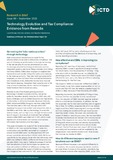| dc.contributor.author | Rossel, Lucia | |
| dc.contributor.author | Santoro, Fabrizio | |
| dc.contributor.author | Hakizimana, Naphtal | |
| dc.coverage.spatial | Rwanda | en |
| dc.date.accessioned | 2024-02-13T11:09:47Z | |
| dc.date.available | 2024-02-13T11:09:47Z | |
| dc.date.issued | 2023-09 | |
| dc.identifier.citation | Rossel, L.; Santoro, F. and Hakizimana, N. (2023) ‘Technology Evolution and Tax Compliance: Evidence from Rwanda’, ICTD Research in Brief 99, Brighton: Institute of Development Studies, DOI: 10.19088/ICTD.2023.048 | en |
| dc.identifier.uri | https://opendocs.ids.ac.uk/opendocs/handle/20.500.12413/18228 | |
| dc.description.abstract | Narrowing the ‘information problem’ through technology. Data on economic transactions is crucial for tax
administrations to be able to enforce tax compliance. One way of obtaining more information is through technology.
In the last decade, African tax administrations have increasingly adopted technological advances such as
integrated systems, electronic filings, and electronic billing machines (EBMs). EBMs allow taxpayers to digitise their
transactions and transfer billing information automatically to the revenue authority. They also hold high potential for
taxpayers, as they can allow firms to lower administrative and compliance costs, streamline transactions, improve
their record-keeping, strengthen their capacity, and in the case of small businesses, attract clients and engage in
trade thanks to the improved accuracy.
Rwanda is one of the fastest growing and most technology-oriented countries in Africa, whose tax authority, despite a steadily rising tax-to-GDP ratio, still faces challenges such as limited resources and high levels of informality. In 2013, the Rwandan Revenue Authority (RRA) introduced EBMs through a machine called EBM1. The machine used a SIM card, through which VAT registered taxpayers transmitted sale transaction data to the RRA in real-time. Like any technology, it came with several issues, such as high costs, storage limitations and lack of support. As a result, an improved free software version called EBM2 was rolled out in 2017, which could digitize and store receipts and capture core business information like inventory and item types. Summary of African Tax Administration Paper 30. | en |
| dc.language.iso | en | en |
| dc.publisher | Institute of Development Studies | en |
| dc.relation.ispartofseries | ICTD Research in Brief;99 | |
| dc.rights.uri | http://creativecommons.org/licenses/by/4.0/ | en |
| dc.subject | Finance | en |
| dc.subject | Technology | en |
| dc.title | Technology Evolution and Tax Compliance: Evidence from Rwanda | en |
| dc.type | Series paper (non-IDS) | en |
| dc.rights.holder | © Institute of Development Studies 2024 | en |
| dc.identifier.doi | 10.19088/ICTD.2023.048 | |
| rioxxterms.funder | Default funder | en |
| rioxxterms.identifier.project | International Centre for Tax and Development (ICTD) | en |
| rioxxterms.version | VoR | en |
| rioxxterms.versionofrecord | 10.19088/ICTD.2023.048 | en |
| rioxxterms.funder.project | 3b220a8a-8703-4b31-ae24-8e7b0c5f7583 | en |


